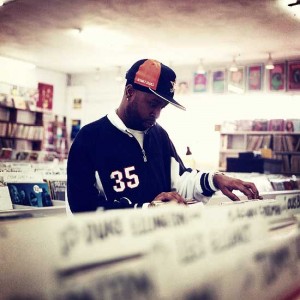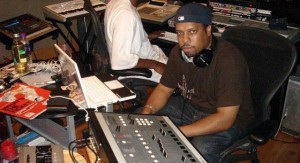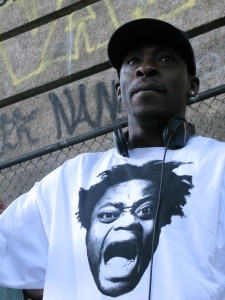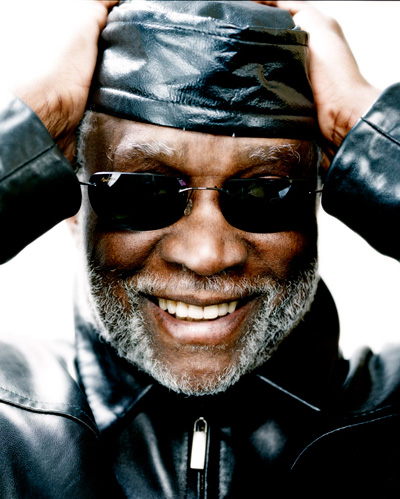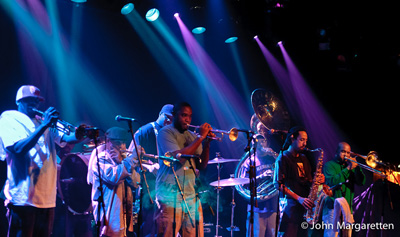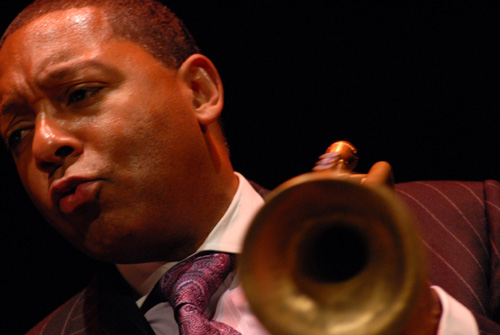Ahmad Jamal: Sampled Into The Hearts Of Hip-hop
Editor’s Note: At 81-years young, pianist Ahmad Jamal is a living jazz legend. And nothing marks the true sign of a legend than transcendence into other genres. Kelly “K-Fresh” Frazier of The Loop Detroit, a blog dedicated to the music of Detroit, writes about Ahmad Jamal’s influence on Hip-hop, bridging generations and keeping traditions alive through the sampling of his music. UMS presents Ahmad Jamal in Hill Auditorium this Saturday, September 17 at 8 pm.
Music has a way of transcending time in ways that are unfathomable. During its ascendance just decades ago, the hip-hop culture would appropriate music ranging from soul to jazz, and everything in between, and revive music, much of it nearly forgotten, from the generations preceding it. Through hip-hop, new groups of music listeners are now able to connect with the same artists that their fathers and grandfathers listened to. While there are countless musicians of yester-years that have found revival in this hip-hop age, the legendary jazz pianist Ahmad Jamal has contributed some of the greatest hip-hop records of all time.
In its infancy, the words spoken in hip-hop were real time accounts of urban struggle and poverty in the inner cities of America. Spawning from impoverished neighborhoods, this culture didn’t have the luxury of real bands with real musicians and real instruments. As a result, hip-hop artists had to borrow, or “sample,” from already-existing pieces of music to make the beats for their songs. These sampled bits, called “breaks,” could be the drums, the piano, the guitar, or anything else, and often looped over and overlaid onto each other to formulate a “band.”
Through sampling, such albums as 1970’s The Awakening, 1973’s Ahmad Jamal ’73, 1974’s Jamal Plays Jamal, and 1974’s Jamalca became forever a part of the hip-hop lexicon, influencing new generations of music producers and musicians. With just a sampling of a mere few seconds from some of Jamal’s work, this classic pianist has reached into the headphones of younger ears.
The best producers have an astute listening ability: to find that perfect loop and translate it into their beats. With these trained ears, many of these producers can find something to sample when the average listener could not. Let’s break down some of the best appropriations of Ahmad Jamal’s music in hip-hop.
At about the 7:29 mark of the nearly 10 minute long “Swahililand” from the Jamal Plays Jamal album, one of the greatest and most recognizable breaks in hip-hop history would occur when a young producer from Detroit named Jay Dee (aka J. Dilla) would sample it for 1996’s “Stakes Is High” from De La Soul. Wildly touted as one of the best songs from De La Soul, it also made Jay Dee one of the most sought after producers in urban music, and he would go on to produce for the likes of Busta Rhymes, Erykah Badu, and Common, among others.
Half way through the song “Dolphin Dance” from 1970’s The Awakening, Chicago producer No I.D. took just a few seconds of Jamal’s piano playing and transformed it into a hip-hop classic with 1994’s “Resurrection” from fellow Chicagoan Common. It’s one of those instances when that ear of No I.D. picked out something so perfect out minutes of piano from Jamal.
While classic hip-hop producers such as Kanye West, Da Beatminerz, Easy Mo Bee, and Buckwild, among others, have sampled Ahmad Jamal’s music, the contributions of giants DJ Premier and Pete Rock have held the most weight. Both producers revolutionized the art of hip-hop sampling in the 1990’s within their own groups (Gang Starr and Pete Rock & C.L. Smooth, respectively), along with producing for a who’s who in urban music. Much of their use of Ahmad Jamal’s material would come with their own groups, but some of the best would be on outside productions.
With the 1994 Nas classic “The World Is Yours,” Pete Rock brought inner city pain and struggle to life as he samples Jamal’s “I Love Music” from 1970’s The Awakening. A few years later, DJ Premier would lift another part of “I Love Music” for the 1996 tune from Jeru The Damaja “Me Or The Papes.” Proof that in the music world, that there are endless ways to sample, it just depends on the ear and creativity of the producer.
DJ Premier would lace Jeru The Dajama again on 1996’s Wrath Of The Math with a Jamal sampled beat for the song “One Day.” This haunting beat would use the strings and the piano of Jamal’s “Don’t Misunderstand” from 1974’s Jamalca, and become one of the most notarized songs in the discography of both DJ Premier and Jeru The Damaja.
For all the artists that have sampled Ahmad Jamal in the past, he has been more than just sampling fodder, but an inspiration to their music as a whole.
11/12 Jazz Series
With four different events, the UMS Jazz Series celebrates jazz’s diversity, highlighting the best in contemporary jazz while honoring jazz’s legacy. Concerts include NEA Jazz Master and pianist Ahmad Jamal with James Cammack, Herlin Riley, and Manolo Badrena; A Night in Treme: The Musical Majesty of New Orleans featuring the Rebirth Brass Band; the Jazz at Lincoln Center Orchestra with Wynton Marsalis; and the Charles Lloyd Quartet, with 2010 MacArthur Fellow Jason Moran, Reuben Rogers, and Eric Harland.
Subscription packages go on sale to the general public on Monday, May 9, and will be available through Friday, September 17. Current subscribers will receive renewal packets in early May and may renew their series upon receipt of the packet. Tickets to individual events will go on sale to the general public on Monday, August 22 (via www.ums.org) and Wednesday, August 24 (in person and by phone). Not sure if you’re on our mailing list? Click here to update your mailing address to be sure you’ll receive a brochure.
An Evening with Ahmad Jamal
Ahmad Jamal, piano
James Cammack, bass
Herlin Riley, drums
Manolo Badrena, percussion
Saturday, September 17, 8 pm
Hill Auditorium
“Ahmad Jamal is not just a living legend of jazz; he is one of the most inspired and inspiring artists in music today.” (AllAboutJazz.com) A key influence on Miles Davis and countless others, NEA Jazz Master Ahmad Jamal incorporates a unique sense of space in his music, and his musical concepts are exciting without being loud in volume. Born in Pittsburgh 80 years ago, Jamal is playing better than ever, with lifetime achievement awards feeling premature given his ongoing desire to push the genre forward.
A Night in Treme: The Musical Majesty of New Orleans
Rebirth Brass Band with special guests from New Orleans
Friday, November 11, 8 pm
Hill Auditorium
The Treme (pronounced truh-MAY) neighborhood of New Orleans has been a source of African-American music and culture for as long as cooks in the Crescent City have been serving red beans and rice on Monday nights. Birthplace of the great New Orleans brass band tradition and one of the first black neighborhoods in America, Treme is the heartbeat of New Orleans and the home to Congo Square. In conjunction with the airing of the second season of the HBO series, which follows a variety of New Orleanians as they try to rebuild their lives in the aftermath of 2005’s Hurricane Katrina, this concert features the legendary Rebirth Brass Band, known for combining traditional New Orleans brass band music, including the New Orleans tradition of second line with funk, jazz, soul, and hip-hop influences.
Jazz at Lincoln Center Orchestra with Wynton Marsalis
Wynton Marsalis, artistic director and trumpet
Wednesday, February 22, 7:30 pm
Hill Auditorium
The February 2010 snowstorm was about the only thing that could keep Wynton Marsalis and the Jazz at Lincoln Center Orchestra away from Ann Arbor! Despite one of the most aggressive touring schedules in the business, JLCO makes each concert fresh, drawing in audiences who are continually energized and amazed by the group’s depth of outrageous talent.
Charles Lloyd Quartet
Charles Lloyd, tenor saxophone and flute
Jason Moran, piano
Reuben Rogers, bass
Eric Harland, drums
Saturday, April 14, 8 pm
Michigan Theater
Forty years ago, saxophonist Charles Lloyd was a pop star; his 1966 album, Forest Flower, sold a million copies. Four years ago, at 69, when most individuals are thinking of ways to slow down and kick back, Charles Lloyd shifted to a higher gear and formed a new quartet. Lloyd has always led exceptional bands, and this is perhaps the best. With 2010 MacArthur Fellow Jason Moran on piano, Reuben Rogers on bass, and Eric Harland on drums, the Quartet’s concerts are events of pristine beauty and elegance, full of intensely felt emotion and passion that touches deep inside the heart.
Return to the complete chronological list.


